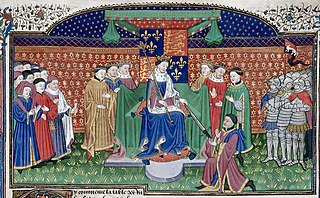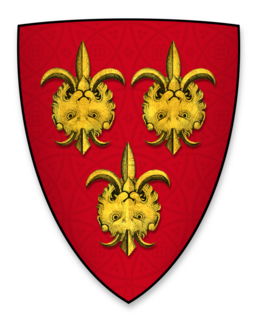Related Research Articles

Cardinal Henry Beaufort, Bishop of Winchester, was an English prelate and statesman who held the offices of Bishop of Lincoln (1398) then Bishop of Winchester (1404) and was from 1426 a Cardinal of the Church of Rome. He served three times as Lord Chancellor and played an important role in English politics.
Walter Reynolds was Bishop of Worcester and then Archbishop of Canterbury (1313–1327) as well as Lord High Treasurer and Lord Chancellor.

John Kemp was a medieval English cardinal, Archbishop of Canterbury, and Lord Chancellor of England.

John Stafford was a medieval English prelate and statesman who served as Lord Chancellor (1432–1450) and as Archbishop of Canterbury (1443–1452).
Marmaduke Lumley was an English priest, Bishop of Carlisle from 1429 to 1450, and Knight Commander of the Order of St. John of Jerusalem. He was a son of Ralph de Lumley, 1st Baron Lumley and Eleanor de Neville. He was elected about 5 December 1429, and consecrated on 16 April 1430. He was Bishop of Lincoln for a short time before his death in December 1450. He was educated at University of Cambridge and was appointed Precentor of Lincoln Cathedral in 1425. He also became Chancellor of the University of Cambridge in 1427 and was Master of Trinity Hall, Cambridge from 1429 to 1443. From 1446 to 1449 he served as Lord High Treasurer of England. Lumley's tenure as Lord High Treasurer occurred during the Great Bullion Famine and the Great Slump in England.
Nicholas of Ely was Lord Chancellor of England, Bishop of Worcester, Bishop of Winchester, and Lord High Treasurer in the 13th century.
William Alnwick was an English Catholic clergyman. He was Bishop of Norwich (1426–1436) and Bishop of Lincoln (1436–1449).

John de Ufford was chancellor and head of the royal administration to Edward III as well as being appointed to the Archbishopric of Canterbury.
John of Thoresby was an English clergyman and politician, who was Bishop of St David's, then Bishop of Worcester and finally Archbishop of York. He was Lord Chancellor of England under King Edward III starting from 1349.

The Bishop of Hereford is the ordinary of the Church of England Diocese of Hereford in the Province of Canterbury.
John Fordham was Bishop of Durham and Bishop of Ely.
Robert Baldock was the Lord Privy Seal and Lord Chancellor of England, during the reign of King Edward II of England.
Adam Orleton was an English churchman and royal administrator.
Ralph Ergham was the English bishop of Salisbury from 1375 to 1388, and then bishop of Bath and Wells from 1388 to 1400.

John Hotham was a medieval Chancellor of the Exchequer, Lord High Treasurer, Lord Chancellor and Bishop of Ely. He was also effective Governor of Ireland for a time.

Edmund Stafford was Bishop of Exeter from 1395 to his death in 1419.
Lewis de Charleton was a medieval Bishop of Hereford in England.
William Ayermin was a medieval Bishop of Norwich.

Robert Wyvil was a medieval Bishop of Salisbury.

John Charlton, 1st Baron Charlton of Powys (1268–1353) came from a family of minor landowners near Wellington, Shropshire. He was the son of Robert Charlton of Apley castle near Wrockwardine.
References
- Fryde, E. B.; Greenway, D. E.; Porter, S.; Roy, I. (1996). Handbook of British Chronology (Third revised ed.). Cambridge, UK: Cambridge University Press. ISBN 0-521-56350-X.
